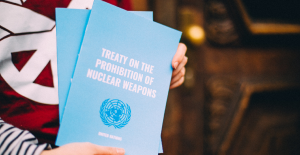“Australia must ‘make sure that we are able to be good nuclear stewards from cradle to grave’.” – Defence Minister of Australia Richard Marles
THE GUARDIAN | Daniel Hurst November 6, 2022 theguardian.com
 The US has warned Australia against joining a landmark treaty banning nuclear weapons, saying the agreement could hamper defence arrangements between the US and its allies.
The US has warned Australia against joining a landmark treaty banning nuclear weapons, saying the agreement could hamper defence arrangements between the US and its allies.
But New Zealand said it was “pleased to observe a positive shift” in Australia’s position in a United Nations vote and “would, of course, welcome any new ratifications as an important step to achieving a nuclear weapon-free world”.
The comments follow the Albanese government shifting Australia’s voting position on the treaty on the prohibition of nuclear weapons to “abstain” after five years of blanket opposition by the Coalition government.
The relatively new treaty imposes a blanket ban on developing, testing, stockpiling, using or threatening to use nuclear weapons – or helping other countries to carry out such activities. But so far it has been shunned by all of the nuclear weapons states and many of their allies.
The US embassy in Canberra said the treaty “would not allow for US extended deterrence relationships, which are still necessary for international peace and security”.
That is a reference to Australia relying on American nuclear forces to deter any nuclear attack on Australia – the so-called “nuclear umbrella” – even though Australia does not have any of its own atomic weapons.
The embassy said the treaty also risked “reinforcing divisions” within the international community.
“While the United States understands and shares the desire to advance nuclear disarmament goals, we do not support the treaty on the prohibition of nuclear weapons,” a spokesperson for the US embassy told Guardian Australia.
“The United States does not believe that progress toward nuclear disarmament can be decoupled from the prevailing security threats in today’s world.”
The comments are a sign of the pushback Australia faces from its top security ally if it gets closer to signing and ratifying the treaty – although that still seems distant.
New Zealand said it welcomed “constructive developments in Australia’s approach” to the treaty, including the shift from opposing a NZ-backed resolution on the topic at the UN general assembly first committee last month.
New Zealand’s minister for disarmament and arms control, Phil Twyford, has met with Australian representatives.
A spokesperson for the Ministry of Foreign Affairs and Trade said New Zealand continued to urge all countries that were not yet a party to the treaty to sign and ratify it “at the earliest opportunity”, while acknowledging it was “for Australia to determine its position”.
The Australian prime minister, Anthony Albanese, has been involved in advocacy against nuclear weapons and has described them as “the most destructive, inhumane and indiscriminate weapons ever created”.
Albanese moved the motion at Labor’s 2018 national conference backing the TPNW, saying the task would not be easy or simple but it would be “just”.
The treaty now has 91 signatories, 68 of which have formally ratified it, and it entered into force last year.
